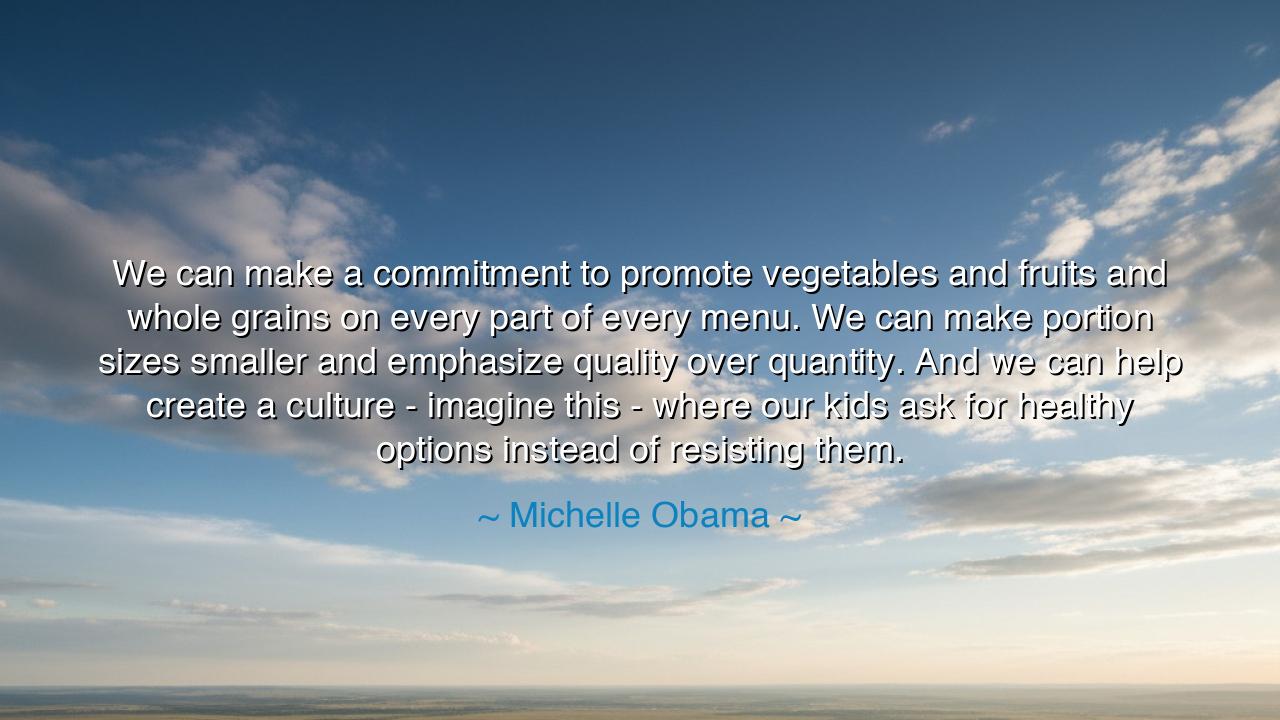
We can make a commitment to promote vegetables and fruits and
We can make a commitment to promote vegetables and fruits and whole grains on every part of every menu. We can make portion sizes smaller and emphasize quality over quantity. And we can help create a culture - imagine this - where our kids ask for healthy options instead of resisting them.






The words of Michelle Obama, “We can make a commitment to promote vegetables and fruits and whole grains on every part of every menu. We can make portion sizes smaller and emphasize quality over quantity. And we can help create a culture — imagine this — where our kids ask for healthy options instead of resisting them,” stand as a call to arms — not for conquest, but for renewal, not for empire, but for the health of a generation. It is a declaration that the true strength of a nation begins at its tables. For what we feed our children, we feed into the future; and what we neglect in their bodies, we will suffer in their destinies. Obama’s words are both visionary and maternal, speaking from a place where wisdom meets care, urging a civilization drowning in excess to rediscover the grace of simplicity.
The origin of this quote lies in Michelle Obama’s tireless advocacy for public health and nutrition during her time as First Lady of the United States. Her “Let’s Move!” campaign sought to combat childhood obesity and restore balance to the American diet — a balance once common but now lost in the flood of fast food, sugar, and convenience. Her mission was not merely about calories, but about culture — about reawakening the ancient relationship between humanity and the earth, between nourishment and gratitude. In a society where abundance had led to neglect, she called for consciousness. Her quote was a modern echo of an ancient truth: that the body is the foundation of the spirit, and that to care for the body through wholesome food is to preserve the heart and mind of a people.
In the style of the ancients, one might say that Obama’s message is an invitation to restore the harmony of life. The ancients believed that health and virtue were bound by the same law — that moderation, discipline, and respect for nature’s gifts were sacred duties. The philosopher Plato wrote that education must begin not in the mind, but in the diet; that children should first learn temperance through the food they eat. Likewise, Hippocrates, father of medicine, taught that food should be one’s first medicine. In this lineage, Michelle Obama’s words are a continuation of timeless wisdom — that how we eat reflects how we live, and that a society that values life must first value nourishment.
Her words also shine with moral courage, for she spoke them to a world intoxicated by consumption. In a culture where bigger was equated with better, and convenience replaced care, she dared to say that quality matters more than quantity — that smaller portions and purer ingredients are not deprivation but refinement. She understood that change begins not through force, but through culture — through transforming desire itself. “Imagine this,” she said, “where our kids ask for healthy options instead of resisting them.” That vision is revolutionary, for it calls not just for reform of menus, but for the reformation of the human heart — for a generation that chooses nourishment over indulgence, mindfulness over impulse.
History offers us examples of leaders who, like Obama, saw the power of food as the foundation of strength. In ancient Japan, Emperor Meiji led a national transformation by encouraging balanced diets among his people, understanding that the health of citizens was the health of the empire. Likewise, Mahatma Gandhi, though a man of ascetic simplicity, preached that food was sacred, and that what one consumes should purify, not poison, the spirit. Michelle Obama stands among such voices — modern yet timeless — reminding humanity that the choices made in the kitchen shape the destiny written in history.
Her call to teach children to love what is good reaches beyond nutrition; it is a metaphor for all education. For what is true of food is true of wisdom, of art, of virtue itself. Children do not become noble by command, but by cultivation — by seeing good things celebrated, by tasting the sweetness of what is right. To create a culture where the young ask for health, rather than resist it, is to cultivate a society where the pursuit of goodness becomes natural, where discipline becomes joy, and where self-care becomes reverence. Such a vision requires patience, but it is the labor of civilization itself.
The lesson of Michelle Obama’s words is simple yet profound: health is not built in hospitals, but in homes. It begins with the humble act of choosing what we eat, of valuing nourishment as sacred, of teaching the next generation to honor the body that carries the soul. To answer her call is to make a commitment — to fill our plates with colors of the earth, to eat with gratitude, to waste less and cherish more. Let every meal be a moment of mindfulness, every bite an offering of thanks to the life that sustains us.
So let her words echo as a sacred teaching for all who would build a better world: the strength of a people begins with the wisdom of their diet. To feed our children well is to feed the future well; to nourish their bodies is to shape their spirits. Let us therefore return to the garden, to the soil, to the table — and from these places of simple abundance, renew the health, the hope, and the heart of humanity.






AAdministratorAdministrator
Welcome, honored guests. Please leave a comment, we will respond soon